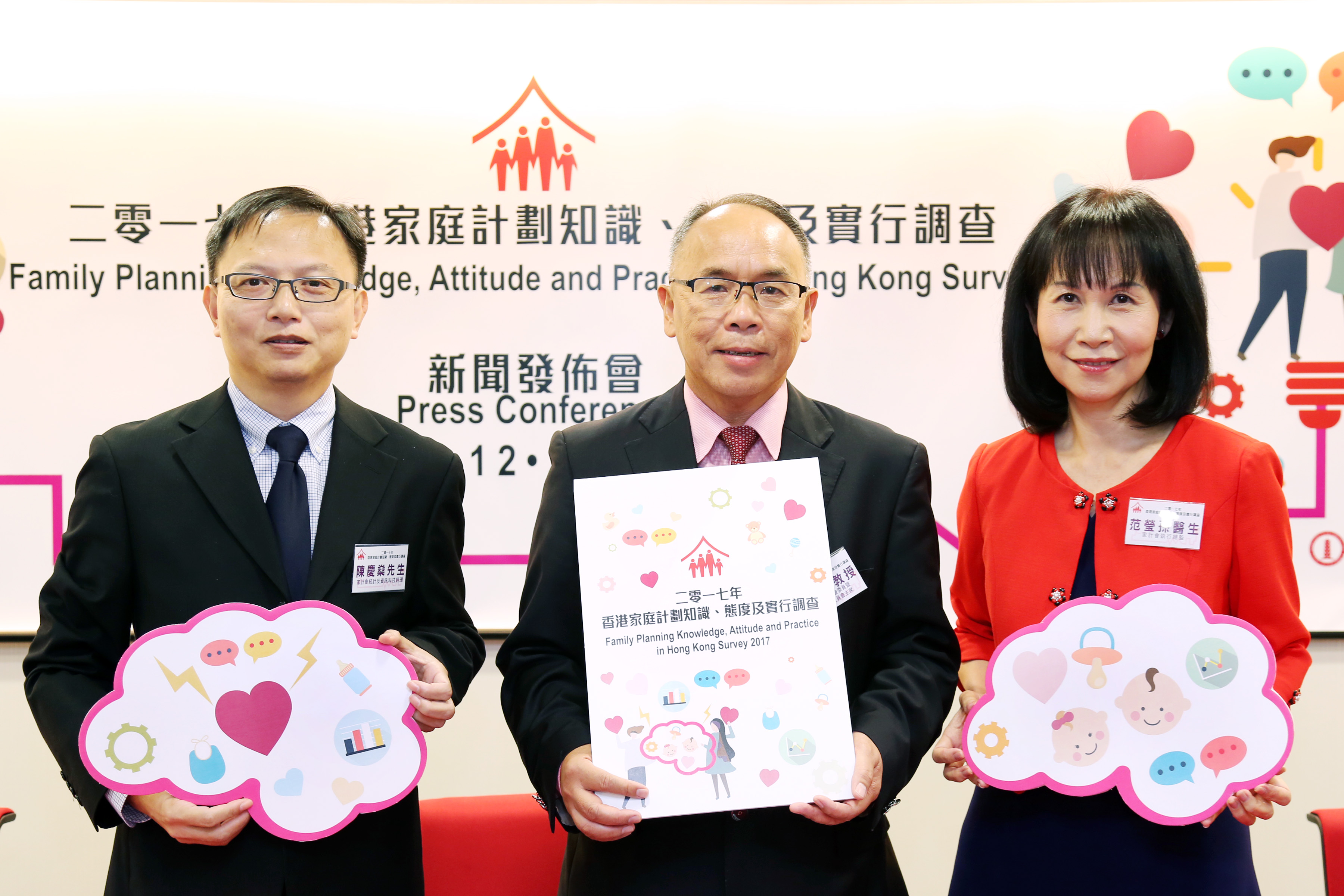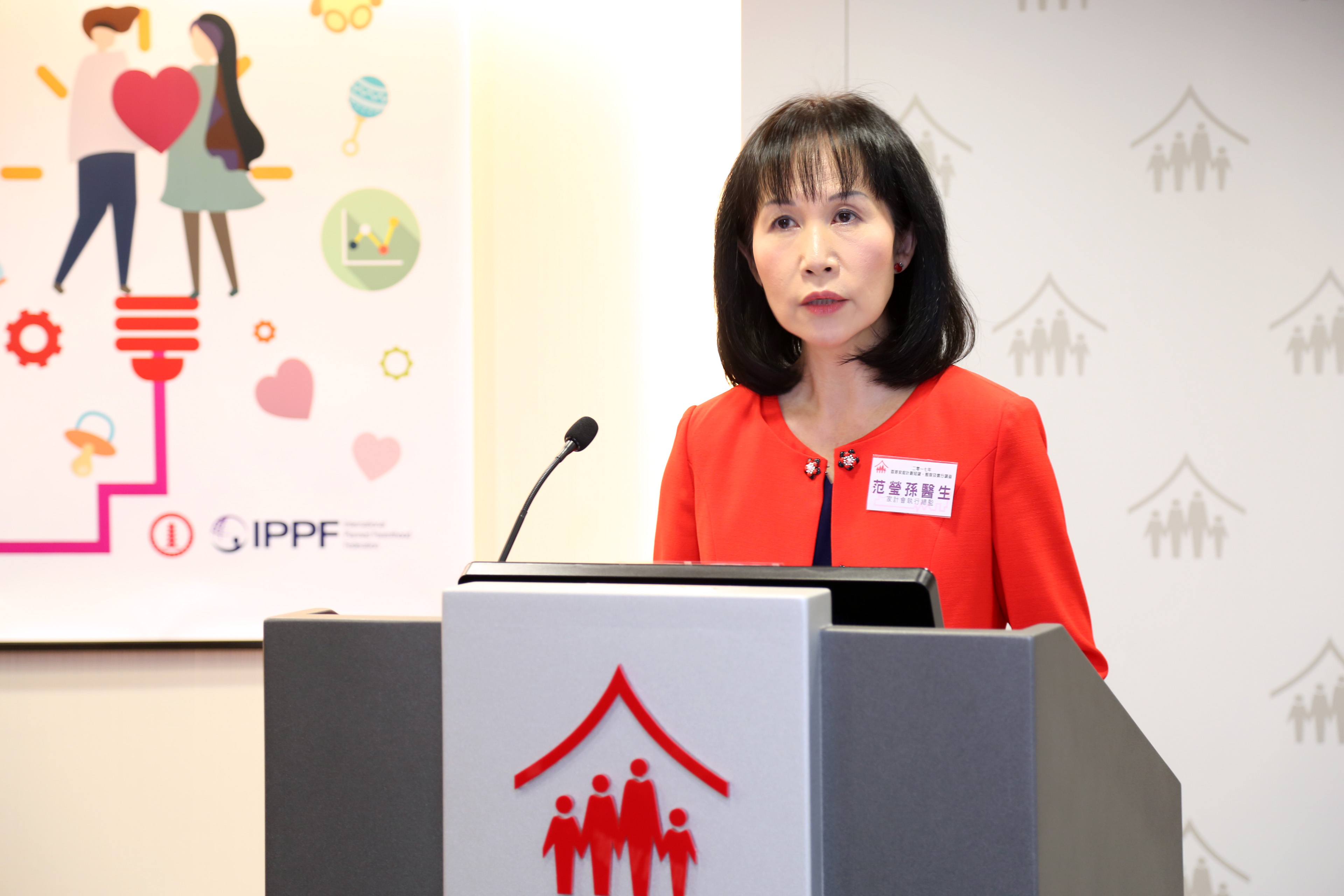22 Apr 2025 - Service Adjustment of FPAHK Yuen Long Birth Control Clinic (G/F) and Yuen Long FPAHK Anita Mui Health Centre (1/F) from 12 May 2025 (Monday)
31 Dec 2024 - Opening Hours of FPA Birth Control Clinics from January to December, 2025
|
4 Dec 2018 |
FPAHK Released Findings on Family Planning Knowledge, Attitude and Practice in Hong Kong Survey 2017
The average actual number of children of Hong Kong couples remained low at between 1.2 and 1.3, and a growing percentage had not decided whether they wanted to have children, according to the latest findings of the Family Planning Knowledge, Attitude and Practice (KAP) in Hong Kong Survey 2017 (the Survey) released by the Family Planning Association of Hong Kong (FPAHK) today.
Professor Paul Yip, Chairman of FPAHK’s Research Sub-committee, Dr. Susan Fan, FPAHK’s Executive Director and Mr. Sun Chan, FPAHK’s Statistics and Information Technology Manager presented the results of this latest territory-wide survey in a press conference today. The Survey has been conducted every 5 years since 1967 to monitor trends in family planning and related issues, including parity, fertility, contraception, induced abortion and marital and sexual life among married and cohabiting couples in Hong Kong. The 2017 Survey, the eleventh in the series, surveyed 1,514 married or cohabiting women aged 15 to 49, and 1,059 of their spouses or partners, between August 2017 and June 2018.
Family Planning and Fertility
The 2017 KAP Survey found that women’s ideal number of children remained at about 1.6 since the 2002 Survey. Just over half the respondents (52.3% of women and 51.7% of men) regarded “two children” as the ideal number. Nearly one third (32.6% of women and 32.1% of men) favoured having only one child. Less than one tenth (8.2% of women and 8.5% of men) preferred to be childless.
For their actual parity, the female respondents had 1.28 children on average, slightly higher than the record low of 1.24 in 2012. The proportion of women with one child (38.5%) continued on its rising trend over the past twenty years and exceeded the proportion of women with two children (34%). On the other hand, the proportion of childless women dropped from the peak of 23.4% in 2012 to 20.7% in 2017. Approximately 15% of the surveyed women said they desired a child or another child, but another 15% were as yet undecided. “Heavy financial burden” and “heavy responsibilities” were the main reasons for having no children or only one child. “Wanting more time and space for personal development” was the third most common reason given by women who did not wish to have any children.
Regarding possible public policies to encourage childbirth, more couples in this Survey compared to the last Survey five years ago indicated that financial incentives, strengthened social support for parents, free pre-school education and improvement in the quality of education, etc., could encourage them to have more children.
Contraception
Male condom remained the most commonly used contraceptive method by a wide margin compared to the other methods. Almost 80% of female respondents were currently using it, and 96.2% of ever users were satisfied with it. Oral contraceptive pills and intrauterine contraceptive device (IUCD) were used by only 6.3% and 6.2% respectively.
The proportion of women who practised contraception every time they had sex appeared to have dropped, from 79.5% in 2007 to 74.8% in 2012 to 66.7% in 2017. Apart from those planning to conceive, or were post-menopausal or were not having sex, 21% said they “sometimes do, sometimes don’t (practice contraception)” or “never practice contraception” or “usually practise (contraception) but just missed it in the past few times”, rising from 7.9% in 2007 and 17.9% in 2012.
Induced Abortion
There was a steady decline in the percentage of female respondents who had undergone induced abortions. Women who ever had an induced abortion decreased from 26.3% in 2002 to 11.5% in 2017, with “not psychologically prepared” (46.8%) and “financial constraints (31.8%)” given as the major reasons for the abortion. Among those who ever had an abortion, 37.6% had their last abortion performed legally at FPAHK or hospitals in Hong Kong. Of the 58.4% who had their last abortion in Mainland China, the majority (56.4%) were not residing in Hong Kong at that time.
Marriage and Sex
Couples had sex for an average of 3.7 times per month, slightly lower than the finding in 2012. Nonetheless, the majority of female and male respondents were satisfied or very satisfied with their marriage (over 80%) and sex life (over 70%). “Crowded living space” and “sharing the same room with children” were the top detrimental factors to their sex life.
Conclusions and Recommendations
Overall, Hong Kong couples’ ideal family size seemed to have reached a plateau over the past 15 years. Various possible public policies conducive to family formation met with more positive response in this Survey compared to the past. The recently proposed extension of statutory paternity and maternity leave would be in line with this direction. FPAHK welcomed the concerted efforts from all sectors of the community to further promote a family-friendly environment. Noting that 15% of women have intention for childbearing while another 15% are undecided, and given the negative impact of age on female fertility, FPAHK encouraged couples to plan early for their families, and urged those encountering difficulty in conceiving to seek help without delay.
As the vast majority of couples rely on the male condom for contraception, FPAHK reminded the public that consistency of use and proper technique were important to ensure the method’s effectiveness. To promote sexual health and contraceptive knowledge among young couples, FPAHK had recently launched the “Tak and Kar Social Media Campaign” on Facebook and Instagram, a comic illustration series about a young couple “Tak and Kar” to debunk common misconceptions about contraception. Women facing an unplanned pregnancy should seek professional help though proper channels to avoid making reckless decisions that they might regret in future.
FPAHK pointed out that the frequency of sex depended on individual couples’ needs and preferences and should not be taken as the only indicator of the quality of sex life. Couples were advised not to neglect their sex life, which is an important part of marital harmony and couple relationship. Recognizing the challenges posed by Hong Kong’s crowded living conditions, FPAHK suggested couples to be flexible and creative in respect of time and location for sex and intimacy. FPAHK offered “Talks on Sex and Intimacy” to equip newly-wed couples with sexual knowledge, communication skills and a healthy attitude for a harmonious sex life. Couples facing sexual disharmony could seek help from FPAHK’s Sex Coaching and Sex Therapy.
Note: PowerPoint file of graphs of the Survey results (available in Chinese only) is available for download at the Press Release Section under Media Centre on FPAHK Website (www.famplan.org.hk)








